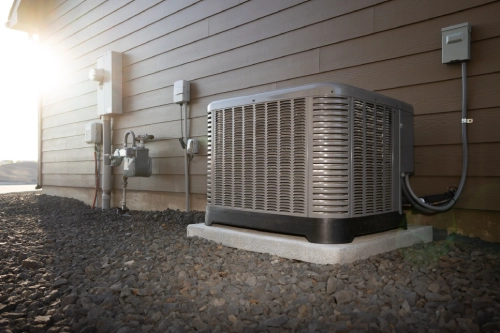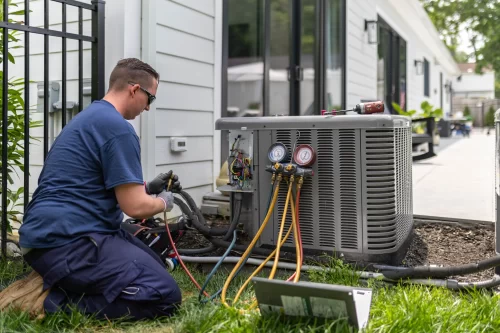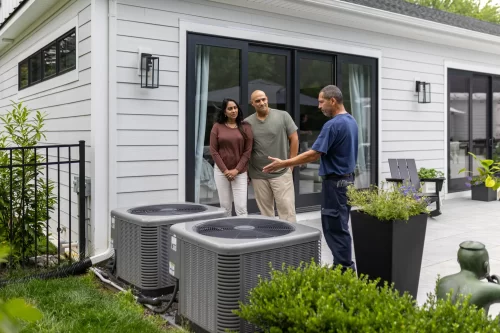What Does an Air Conditioner Compressor Do?
Some people know the ins and outs of HVAC units, but for the most part, hearing a term like “air conditioning compressor” may leave you nodding along without a solid understanding. Well, you’re in luck. Here, you’ll learn what an air conditioner compressor does and why it’s an important part of cooling your home.
The compressor is the heart of the air conditioning system and it’s responsible for the heat exchange process that cools the air. This article will explore how an air conditioning compressor works and why you need it.

The Role of the Air Conditioning Compressor
The main function of an air conditioning compressor is to compress the refrigerant gas and circulate it through the system. For a little background, refrigerant is a chemical that starts as a liquid and changes to gas (or vice versa) depending on the temperature. When it changes state, it absorbs the surrounding heat and then releases it as needed (i.e. for heating in an HVAC unit). In an AC unit, the refrigerant enters the compressor as a low-pressure gas. The compressor then compresses this gas, increasing its pressure and temperature.
This high-pressure, high-temperature gas is then pushed into the condenser coils, where the heat is released to the outside air. The refrigerant, now a high-pressure liquid, continues its journey through the system, eventually evaporating in the evaporator coils and absorbing heat from the indoor air, thus cooling it.
How the Air Conditioning Compressor Works

To understand how an air conditioning compressor works, it's important to grasp the basic principles of refrigeration. The refrigeration cycle involves four main components: the compressor, condenser, expansion valve, and evaporator.
The cycle starts with the compressor, which takes in the low-pressure refrigerant gas and compresses it into a high-pressure, high-temperature gas. This gas then flows to the condenser, where it releases its heat to the outside environment and condenses into a high-pressure liquid.
Next, the high-pressure liquid refrigerant passes through the expansion valve, where its pressure is reduced, causing it to cool and partially evaporate into a low-pressure mixture of liquid and gas. This cool mixture then enters the evaporator coils inside the house.
As the refrigerant evaporates, it absorbs heat from the indoor air and then cools it, cooling the air before it's circulated back into the living spaces. The refrigerant, now a low-pressure gas, returns to the compressor to begin the cycle again. It’s a little in-depth, but having this understanding is super helpful if you suspect an issue with one of the components.
Importance of the Air Conditioning Compressor
As you can see, all parts are essential to a properly working HVAC unit. A malfunctioning AC compressor can lead to various problems, such as:
- reduced cooling capacity
- higher energy consumption and
- potential damage to other components of the HVAC system.
So, regular maintenance and timely HVAC repairs are the keys to keeping your compressor in good working condition.
A well-functioning compressor will help:
- maintain the right indoor temperature and humidity levels in your home.
- prevent the refrigerant from leaking, which can be harmful to the environment and reduce the system's efficiency.
- extend the lifespan of the entire HVAC system, saving you from expensive repairs and replacements.
Common Issues with Air Conditioning Compressors
Like anything mechanical, air conditioning compressors are prone to wear and tear over time. Below are common issues that can affect compressors.
- Electrical issues can arise from faulty wiring, blown fuses, or damaged capacitors, leading to the compressor not starting or shutting down unexpectedly.
- Refrigerant leaks can occur due to damaged coils or connections, which reduces the system's cooling efficiency and cause the compressor to work harder (eventually overheating and failing).
- Mechanical failures can result from worn-out parts, such as bearings, valves, or pistons, causing the compressor to malfunction or stop working altogether.
Regular maintenance, including checking electrical connections, inspecting refrigerant levels, and replacing worn-out parts, can help prevent these issues and keep your AC compressor in tip-top shape.
Signs of a Failing Air Conditioning Compressor

Not sure if your air conditioning compressor is working properly? One of the most obvious signs is a lack of cool air coming from the vents.
Unusual noises, like grinding, rattling, or clunking sounds, can also signal compressor problems. These noises often indicate worn-out bearings, loose components, or other mechanical issues. Additionally, the compressor that frequently cycles on and off may indicate electrical or refrigerant issues.
Then there are those not-so-obvious signs. Sneaky little increases in energy bills could be a sign of a failing compressor. If the compressor is not operating efficiently, the system will work harder to cool the home, leading to energy bills. If you notice any of these signs, do yourself a favor and schedule an inspection with a professional HVAC technician ASAP.
Maintaining Your Air Conditioning Compressor

Proper maintenance will keep your air conditioning compressing humming along smoothly for the long haul. Regular AC maintenance includes cleaning or replacing air filters, checking refrigerant levels, inspecting electrical connections, and lubricating moving parts. It is also important to schedule annual professional maintenance to have a thorough inspection and tune-up of the entire HVAC system.
During a professional maintenance visit, the technician will check the compressor for any signs of wear or damage, test the electrical components, measure refrigerant levels, and ensure the system is operating at peak efficiency. They will also clean the condenser and evaporator coils that can accumulate dirt and debris over time, reducing the system's efficiency and causing the compressor to work harder.
By keeping up with regular maintenance, you can prevent many common issues that affect compressors so you don’t find yourself in a bind when you need your AC most.
When to Replace Your Air Conditioning Compressor
Despite regular maintenance, there may come a time when your air conditioning compressor needs to be replaced. Compressors typically have a lifespan of 10 to 15 years, depending on the quality of the unit and how well it has been maintained. If your compressor is nearing the end of its lifespan, experiencing frequent issues, or has been significantly damaged, it may be more cost-effective to replace it rather than continue with repairs.
When considering a replacement, make sure you choose a high-quality compressor that is compatible with your existing HVAC system. A professional HVAC technician can help you select the right compressor and ensure it is installed correctly so you don’t experience any issues. Trust NJR Home Services for your air conditioning system installation. Our energy-efficient models can help save you money on monthly energy bills and reduce costly repairs. If your unit is over 10 years old and struggling to keep your home cool, it may be time for an upgrade. Reach out for a free, no-obligation quote and we’ll guide you through the process every step of the way.
Get helpful tips and updates by signing up for our Home Comfort e-newsletter.
For email marketing you can trust. *By providing your email address, you will be signed up to receive newsletters and special promotional emails. You have the right to unsubscribe at any time.